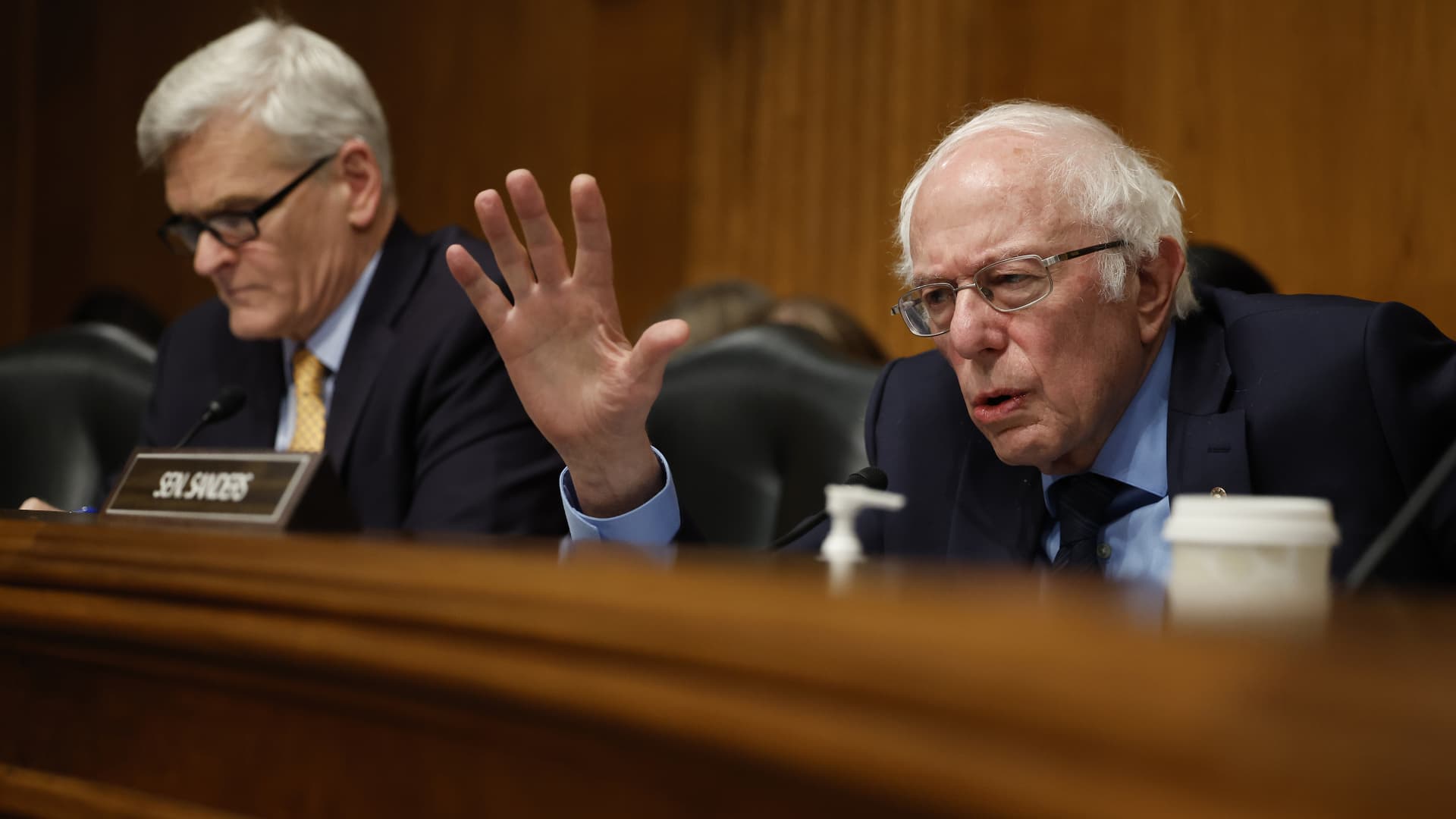Senate Health, Education, Labor and Pensions Committee Chairman Bernie Sanders (I-VT) questions witnesses along with Ranking Member Senator Bill Cassidy (R-LA) during a hearing on work hours in the Dirksen Senate Office Building on the Capitol Hill in March February 14, 2024 in Washington, DC
Chip Somodevilla | Getty Images
Sen. Bernie Sanders and Senate Democrats on Thursday pointed to advances in artificial intelligence and automation in their argument for a bill that would mandate a 32-hour federal workweek.
“Despite massive growth in technology and labor productivity, millions of workers in our country are working longer hours for low wages,” Sanders said after opening a hearing of the Senate Health, Education, Labor and Pensions Committee.
“The sad reality is that Americans now work more hours than people in any other wealthy country,” the committee chairman and Vermont independent said later.
The bill, introduced by Sanders and Sen. Laphonza Butler of California, would reduce the standard workweek from 40 hours to 32 hours over four years.
Employers would be required to pay non-exempt employees overtime compensation equal to 1.5 times the hourly rate for each hour worked in excess of eight hours in a single day and twice the hourly rate for each hour worked in excess of 12 hours.
The bill would also guarantee that total weekly wages are not reduced due to the reduction in total hours worked.
Rep. Mark Takano of California has introduced a similar bill in the House of Representatives.
The bills come months after business leaders like JPMorgan Chase CEO Jamie Dimon and Microsoft Co-founder Bill Gates predicted that within decades, people could be working just three days a week due to innovations in AI and automation.
Sanders and Democrats said at Thursday’s hearing that shortening the workweek would allow people to spend more time with family and their hobbies.
“Many people find their work valuable, and I’m glad they do, but for many people the institutions, clubs and churches they are affiliated with and spend time with outside of work are even more valuable,” said Senator. Chris Murphy, D-Conn.
Republicans criticized the plan, saying the mandate would devastate small businesses and hurt industries such as retail stores that are required to be open six or more days a week.
“It would be napalm against the fire of inflation,” said Sen. Bill Cassidy of Louisiana, the ranking Republican on the committee.
Another Republican on the panel, Sen. Mike Braun of Indiana, said: “I object to trying to do anything from here that would put so much pressure on the hundreds of companies out there that I think they just couldn’t survive.” “
In her testimony before the committee, Boston College sociology professor Juliet Schor said her research shows that a four-day, 32-hour week would increase hourly productivity for both workers and management. Schor said her research also found that employees’ well-being increased outside of the office.
Jon Leland, chief strategy officer of crowdfunding platform Kickstarter, said his company’s goal completion rate and employee retention skyrocketed after implementing a four-day week.
“People want to work, but they want to work in a way that is consistent with the rest of their lives,” Leland told the jury.
But another witness, Liberty Vittert, disputed studies that found higher productivity with a shorter workweek. Vittert said these productivity gains disappear over time.
“We don’t yet know what capabilities AI will give us,” said Vittert, a professor of data science at Washington University in St. Louis.
Cassidy suggested holding a hearing on the impact of AI on the economy.
But he also said it was unlikely that advances in this technology would allow most workers to reduce their working hours.
“A mom-and-pop restaurant doesn’t see a real increase in productivity from AI,” Cassidy said.
“They’re having trouble finding enough people to fill their shifts.”
Source link
2024-03-15 18:59:36
www.cnbc.com







